- HOME
- Alumni News
- Activity Reports
- Yonten’s Activity Report
Activity Reports
Yonten’s Activity Report
My Experience with the Duskin Leadership Training Program in Japan and its Impact in Bhutan
I participated in the 20th Duskin Leadership Training program in Japan for a duration of 10 months, starting in September 2018 and returning to my home country in July 2019. This program was specifically designed for young individuals with disabilities residing in Asia and the Pacific who aspire to become future leaders and contribute to the betterment of the community for persons with disabilities.
Throughout my time in Japan, I gained valuable knowledge and skills, ranging from learning the basic Japanese language to understanding the services and welfare provided for persons with disabilities in Japan.
One of the most valuable experiences I had was visiting various centers that provide services for persons with diverse disabilities. It allowed me to interact directly with people with disabilities and exchange insights. Additionally, I had the privilege of meeting other Japanese experts who are dedicated to the welfare of persons with disabilities in Japan, and the training I received from them was enriching and fruitful.
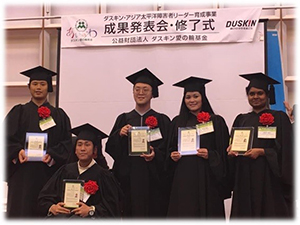
My achievement after my Duskin graduation to the present moment
National Policy for Persons with Disabilities
Upon my return from Japan, I joined DPO Bhutan as an Assistant Program Officer. On September 19, 2019, we received a Braille production set called Index Everest V5 Braille Embosser, along with a laptop which perfectly complemented my professional skills and knowledge gained from Japan.
I worked with the Royal Government of Bhutan, funding agencies, and DPO to make the National Policy for Persons with Disabilities accessible to individuals with visual impairments. This involved embossing numbers of the policy into Braille format. The government launched the policy with accessible formats on 3rd December 2019, coinciding with the International Day for Persons with Disabilities, in order to empower persons with blindness and deafness in Bhutan by providing them with access to information.
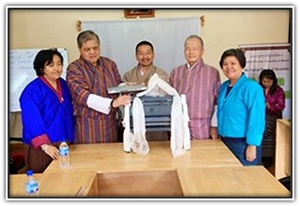
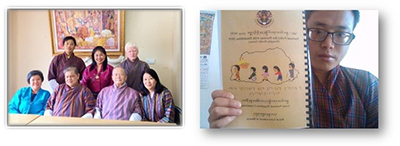
Tactile Book Productions
Moreover, with the emergence of the COVID-19 pandemic in Bhutan, individuals with disabilities have become highly susceptible, facing direct challenges in accessing information related to COVID-19. In response, I offered my assistance by developing audio and tactile posters that provided step-by-step instructions for handwashing, tailored specifically to cater to the needs of individuals with visual impairments, aiming to protect them from the impacts of COVID-19.
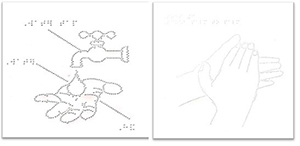
Disability Inclusive Calendar
I used what I learned in Japan to create the first-ever Disability Inclusive Calendar in Bhutan, with support from UNFPA Bhutan. The calendar is designed for people who are blind or have low vision, with Braille and large print text to make it easy for them to access important events and dates. It's a small but important step towards creating a society that values the needs of everyone. The calendar aims to empower and include people with disabilities in Bhutan by providing accessible information.
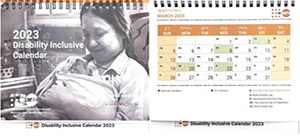
Nature for All Project
DPO Bhutan, in collaboration with SGP, UNDP Bhutan, took steps to ensure that information was accessible to individuals with deafness and blindness. I created brochures in multiple formats, including Braille, audio, and Bhutanese Sign Language videos, to raise awareness about grant opportunities. As a result, a group of persons with blindness turned up and developed a proposal for an inclusive natural garden called "Nature for All." The project was approved and we successfully implemented in the Royal Botanical Garden in Thimphu, making it accessible to everyone to enjoy the wonders of nature. Presently, individuals with diverse disabilities, as well as senior citizens, can now enjoy nature in an accessible environment including accessible toilet at the Royal Botanical Garden in Thimphu.
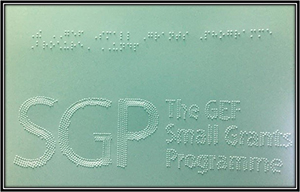
DET to Public Service providers
Disability Equality Training serves as a means to promote equal opportunities, respect, and dignity for individuals with disabilities, while fostering a more inclusive and accommodating environment for all, regardless of our abilities. It is a powerful tool that empowers individuals with disabilities and contributes to the creation of an inclusive society. As a team, my friend with a disability and I had the opportunity to facilitate Disability Equality Training for more than 2000 public service providers (Policy Makers, Election officials, Local leaders, Health Workers, UN Bhutan staff, Financial Institutions, City Bus drivers and Conductors, Taxi Drivers, Organizations for persons with disabilities, private sector. The training focused on equipping them with the knowledge and skills to provide appropriate services when individuals with disabilities seek assistance or appeal for services.
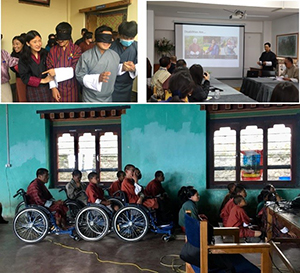
Financial Institutions services
I have been actively advocating to banking institutions about the needs and challenges faced by individuals with disabilities. Through our sensitization efforts, the banking institute has taken several positive steps to improve accessibility. This includes the establishment of a priority counter dedicated to serving persons with disabilities, making infrastructural changes to ensure accessibility, and currently working on installing audio or screen readers on selective ATMs to enhance usability for individuals with visual impairments. These efforts by the banking institution are commendable and reflect their commitment towards inclusivity and accessibility for all customers, including those with disabilities.
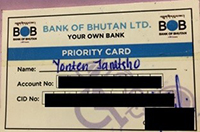
Improvement of City Bus Service
As soon after our Disability Equality Training to City Bus Service personnel, the Bus service office in Thimphu city has implemented various measures to improve the accessibility and convenience of their public transportation system. These measures include the introduction of 19 accessible city buses, the adoption of smart card technology, providing a 20% discount for passengers with disabilities, and the installation of audio announcements in the bus to indicate next stops. This comprehensive approach showcases the Thimphu City Bus office's dedication to inclusivity and efficient service provision, making public transportation more accessible and user-friendly for all passengers.

Blind Chess Club
I had the opportunity to meet with an American woman who shared insights on how individuals with blindness are engaging in social activities. With her assistance, I was able to obtain support from the Bhutan Foundation based in America, to acquired 27 chess boards designed specifically for individuals with visual impairments. This inspired me to start the Thimphu Blind Chess Club, where people with visual impairments can come together, play chess, and make friends in the community.
This club provides a platform for individuals with visual impairments to come together, play chess, and engage in meaningful interactions, promoting social inclusion and empowerment. The support from the Bhutan Foundation and the establishment of the Thimphu Blind Chess Club have been instrumental in creating opportunities for socialization and community engagement for persons with blindness in our area.
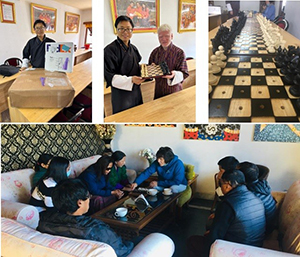
Acknowledgement
Participating in the Duskin Leadership Training program in Japan has been a life-changing experience for me, providing me with valuable knowledge and skills to empower. Therefore, I am immensely grateful to Ainowa Foundation, JSRPD, Toyama Sunrise for your unwavering support, which has enabled me to make a meaningful impact in the lives of persons with disabilities in Bhutan.
Submitted by Yonten Jamtsho
20th Duskin Trainee
Bhutan




